http://www.yahoo.com/_ylt=AnuGrJ7qR6WjvktLkMLUlWebvZx4;_ylc=X3oDMWFjZzdqNDd2BF9TAzIwMjM1MzgwNzUEYQMxMjA2MjUgbmV3cyBzY290dXMgaW1taWdyYXRpb24gcnVsaW5nIHQEY2NvZGUDcHpidWZjYWg1BGNwb3MDMQRlZAMxBGcDaWQtMjM1MDYyMQRpbnRsA3VzBGl0YwMwBGx0eHQDUnVsaW5nb25Bcml6LmltbWlncmF0aW9ubGF3BG1jb2RlA3B6YnVhbGxjYWg1BG1wb3MDMQRwa2d0AzEEcGtndgMyMwRwb3MDMARzZWMDdGQtZmVhBHNsawN0aHVtYmxpbmsEdGFyA2h0dHA6Ly9uZXdzLnlhaG9vLmNvbS9ibG9ncy90aWNrZXQvc3VwcmVtZS1jb3VydC11cGhvbGRzLWtleS1wYXJ0LWFyaXpvbmEtaW1taWdyYXRpb24tbGF3LTE0MTkyNzUxNC5odG1sBHRlc3QDNzAx/SIG=13s2mbqis/EXP=1340724768/**http%3A//news.yahoo.com/blogs/ticket/supreme-court-upholds-key-part-arizona-immigration-law-141927514.html Supreme Court upholds key part of Arizona immigration law, strikes down rest


By
Liz Goodwin, Yahoo! News |
The Ticket – 1 hr 1 min ago

Demonstrators stand outside the Supreme Court in Washington, Monday, June 25, 2012. (Evan Vucci/AP) The Supreme Court
upheld a key part of Arizona's tough anti-illegal immigration law in a 5-3 decision on Monday that allows police officers to ask about immigration status during stops. That part of the law, which never went into effect because of court challenges, will now immediately be enforced in Arizona. Other parts of the law, including a provision that made it a state crime for illegal immigrants to seek work, will remain blocked, as the justices affirmed the federal government's supremacy over immigration policy.
Justice Anthony Kennedy, the court's swing vote, wrote the opinion, and was joined by Chief Justice John Roberts, Ruth Bader Ginsburg, Stephen Breyer and Sonia Sotomayor. Conservative Justices Antonin Scalia, Samuel Alito and Clarence Thomas partially dissented, saying the entire law should have been upheld.
In the opinion, Justice Kennedy wrote that the federal government's "power to determine immigration policy is well settled." But he also showed concern for what he described as Arizona's outsize burden in dealing with illegal immigration, seeming to sympathize with their decision to butt in on immigration enforcement. "Arizona bears many of the consequences of unlawful im­migration," he wrote. "Hundreds of thousands of deportable aliens are apprehended in Arizona each year." But, ultimately, the justices found that Arizona can not mete out their own state punishments for federal immigration crimes.
"Arizona may have under­standable frustrations with the problems caused by illegal immigration while that process continues, but the State may not pursue policies that undermine federal law," Kennedy writes in the opinion's conclusion.
The police immigration checks are allowed, however, because state police would simply flag federal authorities if they find an illegal immigrant.
Nevertheless, Arizona Gov. Jan Brewer is casting the decision as a "victory" for the state. "I am confident our officers are prepared to carry out this law responsibly and lawfully. Nothing less is acceptable," she said in a statement, adding that officers have been trained not to racially profile in their stops. Meanwhile Erika Andiola, an activist and undocumented immigrant in Arizona, says that the Latino community will not be happy with the decision, as the immigration checks portion of the law was most unpopular with them. "It's another message to the Latino community that if you look brown you're a perfect target for the police," she said.
The Obama administration sued to block Arizona's law, called SB1070, shortly after it passed two years ago, saying it interfered with federal authority over immigration. The law made it a state crime for illegal immigrants to seek work or fail to carry proper immigration papers. It also requires police officers to check immigration status and make warrantless arrests for immigration crimes in some cases. A federal judge prevented those aspects of the law from going into effect, but the law became a lightning rod around the country, sparking boycotts and counter-boycotts and opening up a debate about the nation's illegal immigrant population.
In oral arguments in April, many of the justices seemed deeply skeptical of the government's argument that local police officers would interfere with federal authority over immigration law they began asking people about their immigration status during stops. Though much of the debate around the law has focused on "racial profiling"--whether Hispanic people would be stopped and questioned by police based on their ethnicity--the government did not even mention those words in their case against the law, instead focusing on the federal government's supremacy in immigration matters. Justices repeatedly criticized the government's argument against immigration checks. Even Sonia Sotomayor, part of the court's liberal wing, said she was "terribly confused" by the government's argument against the checks.